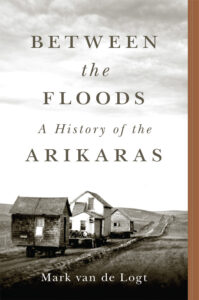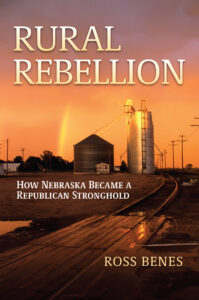Mark van de Logt: Between the Floods: A History of the Arikaras
June 11, 2025 by David
Filed under Non-Fiction, WritersCast
 Between the Floods: A History of the Arikaras — Mark van de Logt — University of Oklahoma Press —Paperback — 9780806194905 — 384 pages — $29.95 – October 1, 2024 – ebook versions available at lower prices
Between the Floods: A History of the Arikaras — Mark van de Logt — University of Oklahoma Press —Paperback — 9780806194905 — 384 pages — $29.95 – October 1, 2024 – ebook versions available at lower prices
During the past couple of years, I’ve read several really good books that recast the history of indigenous Americans both prior to, during, and after the invasion of North America by Europeans, first by explorers, fishermen and traders, and later by colonizers. Almost everything most of us learn about this part of the history of the Americas has been told and taught from the European perspective. Academic studies have similarly been mostly conducted by white Americans with indigenous people seen as subjects for interrogation and study by what is proposed to be a more “accurate” form of science, rather than treating indigenous people as equals, with practical knowledge, historical awareness, and actors with full credibility in the telling of their own histories and practices.
Mark van de Logt’s excellent book Between the Floods, purposely challenges the way the history of an indigenous people is studied and understood. Mark gives credence from the outset to the oral storytelling of the Arikara people, that sets forth their history in an oral tradition, which he then supplements with other forms of knowledge to expand them.
The Sahnis, or Arikara, as they are best known, were at one time a powerful independent nation, who likely migrated from the southwest hundreds of years ago, and settled in the Missouri River region in what is now mostly Nebraska (though today, the tribal lands are the Fort Berthold Reservation in North Dakota.)
The Arikaras, like their Hidatsa and Mandan neighbors on the northern plains, were both farmers and hunter-gatherers who thrived as corn growers and successful buffalo hunters. The arrival of Europeans, even hundreds of miles away from them brought pressure on their villages from other indigenous nations, notably the Lakhotas, whose larger population and more successful military forces caused displacements and relocations, and contact with Euro-Americans brought devastating diseases and other problems for the Arikara as well. Their important location on the Missouri River brought them into contact early on with French fur traders, the Spanish, and especially Americans after Lewis and Clark, often with damaging effects on their tribe.
Between the Floods creates a historical narrative of a resilient semi-sedentary people in their migration and settlement as they confront the colonialist era, endure many tribal conflicts, experience terrible diseases, and incorporate horses and metal tools into their culture. Arikara oral traditions and histories provide an entry into their past and current culture that at its core has survived intact despite so much suffering at the hands of their enemies and the conquering American society.
Mark uses information from archaeology, linguistics, and anthropology to enhance native storytelling, and the book is illustrated with Native maps and ledger art, along with historical photographs and drawings. There is no better way to understand this important tribal nation that likely is known to very few Americans today.
This is a terrific book. It’s well written, well-researched, and demonstrates throughout a deep appreciation for the Sahni people, their lifeways, history and traditions. This kind of history-telling is really important not only for the tribe but to all of us who know so little about their past and present lives. And Mark deep knowledge and broad field of study makes him a terrific interview subject.
Mark van de Logt is Associate Professor of History at Texas A&M University of Qatar, teaches in the Department of Modern Languages and Cultures at Radboud University, and is also the author of War Party in Blue: Pawnee Scouts in the U.S. Army (2010) and Monsters of Contact: Historical Trauma in Caddoan Oral Traditions (2018). Between the Floods was awarded the Erminie Wheeler-Voegelin Prize for best book in Ethnohistory from the American Society for Ethnohistory. His current research involves linking oral traditions to historical events. His articles appeared in the “Journal of Military History,” the “American Indian Quarterly,” the “American Indian Culture and Research Journal,” and “Wicazo Sa Review.” He is (co-)editor of the University of Nebraska Press’s “Studies in the Anthropology of North American Indian” series.
There is an interesting interview with Mark about the Arikara scouts for “The Friends of Little Bighorn” here.
Podcast: Play in new window | Download
Ross Benes – Rural Rebellion: How Nebraska Became a Republican Stronghold
June 4, 2021 by David
Filed under Non-Fiction, WritersCast
 Rural Rebellion: How Nebraska Became a Republican Stronghold – Ross Benes – 9780700630455 – hardcover – University Press of Kansas – 256 pages – $29.95 – January 26, 2021 – ebook versions available at lower prices
Rural Rebellion: How Nebraska Became a Republican Stronghold – Ross Benes – 9780700630455 – hardcover – University Press of Kansas – 256 pages – $29.95 – January 26, 2021 – ebook versions available at lower prices
Ross Benes is a journalist and author who now lives in New York City. But he was born and raised in a tiny town in Nebraska. That experience shaped his early worldview, and of course also makes him suited to understand and explain the culture and politics of his home state to the rest of the world. As the book subtitle lays out, he’s after explaining how Nebraska, like so many other midwestern and southern states, has gone from having a diverse electorate to being viewed as almost monolithically conservative in its views and policies. While the book is focused on Nebraska, much of what he describes about the political culture of his home state broadly applies to much of the rest of our contentious country.
Nebraska may be quite similar to many other midwestern states, but as Benes explains, Nebraska has a long history of populism and quite a commitment to direct democracy and even nonpartisanship. This makes it even more curious to try to understand what has happened there over the past twenty five or more years.
Nebraska is, except for its urban and college town oases, as purely “Trump country” as it could be. As a native-born Nebraska who has broadened his horizons by living in (heavens protect us) the heart of liberal America and working for (even worse) the so-called “liberal media,” Benes may be an ideal interlocutor between these two wildly divergent Americas.
Rural Rebellion gives Benes the opportunity to document Nebraska, past and present, exploring its political history and current explores landscape through the lens of his own personal, family, and small town experiences. There is no question that he deeply cares for his home town and home state, despite the flaws he is determined to call out. In the course of writing this book, he interviewed family, friends, and fellow citizens as well as US senators, representatives, governors, state representatives in the uniquely Nebraskan unicameral governing body, and other political figures, all toward showing Americans not only how we got here, but what we might imagine doing by way of antidote. Benes remains clear-eyed about the difficulty of any sort of success in “healing” the rifts in our body politic and culture. He wishes for a form of discourse that may literally be impossible in a world where some 30% of the overall population, and a much higher percentage of the Nebraska population, simply does not recognize the same reality as many other Americans. Fox News certainly deserves some of the credit, but as Benes points out, small town churches and their powerful anti-abortion, anti-“sin” worldview, and the lack of cultural diversity in rural communities are deeply rooted and provide much to explain how it is we got where we are today.
Benes has one foot rooted firmly in the state he grew up in, the other foot is planted in a completely different environment. Because he has experienced both nodes of our dissonant culture, he can see the full spectrum of our anguish. I am not sure anyone can resolve the differences though. And I do not believe that the “both sides” approach of traditional journalism really works anymore.
While it is certainly true that people in the Fox News dominated, evangelically oriented. semi-rural heartland are all too often viewed as stick figures by many who live in the more diverse and tolerant urban coasts, it is Fox and the church leaders who create imaginary portraits of the people with whom they disagree in outlook and belief, and the right wing now stokes a belief system that see fellow citizens as less than human to a degree that is impossible to excuse. This is not a situation where “both sides” are equally responsible.
In Rural Rebellion, Benes recounts real-life stories that help explain rural Americans’ attitudes about abortion, immigration, and the so-called big government they forget supports their agricultural successes. He also tells his own stories about how his views changed over time away from home, and crucially locates some of the reasons in the ways that what he was taught were impossible. While his argument – that Americans would be less hostile to one another if they just knew each other a little better – makes sense in theory, there are too many powerful forces at work that have a vested interest in keeping Americans at each others’ throats. We want to believe in the essential goodness of our fellow citizens, but there are those that are working diligently to prevent that from happening. No matter where you may fall in the spectrum of belief system, Rural Rebellion is quite useful and a valuable contribution to our socio-political discourse.
Ross Benes is the author of The Sex Effect (2017) and Sex Weird-o-Pedia (2019). He has written for Entertainment Weekly, Esquire, Lincoln Journal Star, Nation, Omaha World-Herald, Rolling Stone, Wall Street Journal, and others. In addition, he is an analyst at eMarketer. A native of Brainard, Nebraska (population 420), he now lives in New York City but still roots for the Nebraska Cornhuskers.
We had a terrific conversation about this book. I hope you enjoy it as well.
You can find the book for sale here at Bookshop.org.
“Rural Rebellion is informative whether or not you agree with the author’s political views. . . . Benes does a good job connecting past and present, and he asks many of the questions that historians are likely to ask when they look back on the early twenty-first century.” —Nebraska History
Podcast: Play in new window | Download


